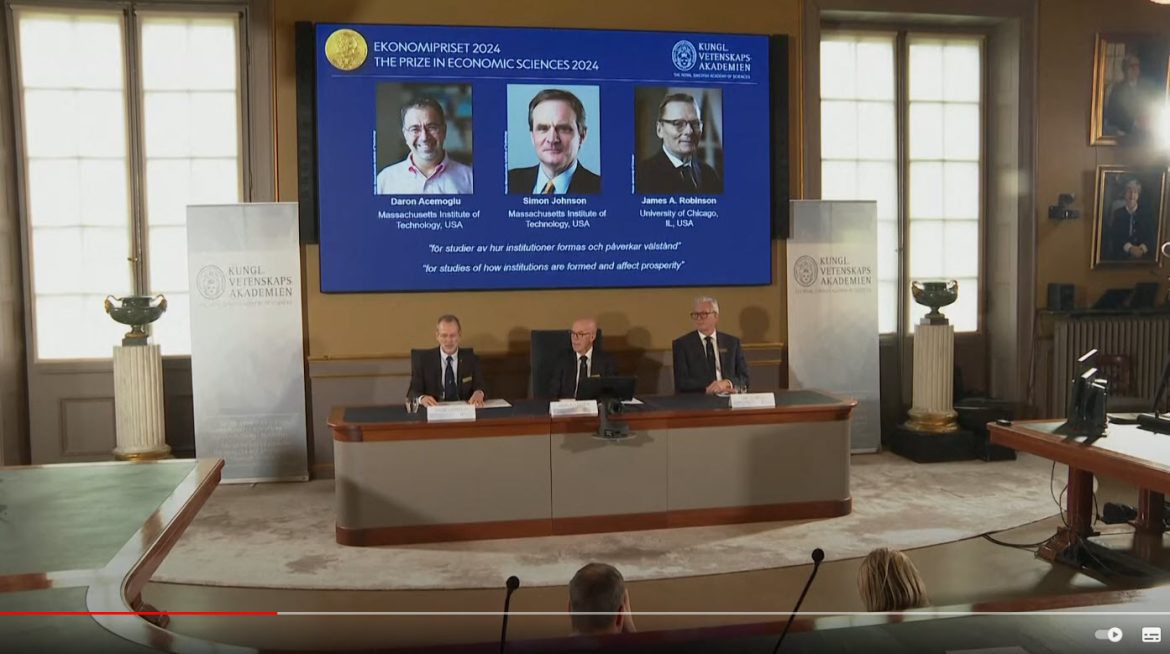The 2024 Nobel Prize in Economic Sciences has been awarded to three prominent U.S.-based economists—Daron Acemoglu, Simon Johnson, and James A. Robinson—for their groundbreaking research on the crucial role that societal institutions play in a nation’s economic prosperity. The trio will share the prestigious award, which recognizes their extensive work demonstrating that poor rule of law, corruption, and exploitative institutions hinder economic growth and prevent positive societal change.
The Royal Swedish Academy of Sciences announced the recipients during a formal presentation led by Secretary General Professor Hans Ellegren. “This year’s prize is awarded to three scholars who have shown how institutions fundamentally shape economic outcomes,” Ellegren said. “Their research demonstrates that when societal institutions fail to serve the interests of the population and instead exploit people, they prevent the possibility of long-term growth and stability.”
Daron Acemoglu, a professor at the Massachusetts Institute of Technology (MIT), Simon Johnson, also at MIT and a former chief economist at the International Monetary Fund (IMF), and James A. Robinson, a professor at the University of Chicago, have collaborated extensively on research focusing on how political and economic institutions determine the success or failure of nations. Their work spans several decades and has shaped contemporary economic thought on development and prosperity.
One of their most notable contributions is the book Why Nations Fail: The Origins of Power, Prosperity, and Poverty, which has become a foundational text in understanding why some countries succeed while others remain trapped in cycles of poverty. The economists argue that inclusive institutions—those that allow widespread participation and enforce fair legal frameworks—create the conditions necessary for sustained economic growth, while extractive institutions, which concentrate power and wealth in the hands of a few, lead to stagnation or decline.
Acemoglu, Johnson, and Robinson’s research has been widely cited in academic, policy, and global development circles, offering insights into why countries with similar natural resources or geographic conditions can have drastically different economic outcomes. Their work demonstrates that institutions that provide a stable rule of law, accountability, and protection of property rights are essential for creating environments where innovation and economic growth can thrive.
In their Nobel-winning research, the economists highlight historical case studies to illustrate their arguments, showing that countries with weak, corrupt institutions often fail to develop sustainable economies. They emphasize the importance of governance reforms in nations seeking to overcome poverty and grow their economies.
“Their work underscores a fundamental truth: prosperity is not just about having resources, but about how those resources are managed and distributed,” said Ellegren during the announcement. “These insights have not only expanded our understanding of economics but have also provided practical guidelines for policymakers around the world.”
The recognition of Acemoglu, Johnson, and Robinson with the Nobel Prize in Economic Sciences comes at a time when many countries are grappling with institutional reform, particularly in regions facing challenges related to corruption, inequality, and political instability. Their findings provide a critical framework for understanding how reforms in governance can help drive sustainable development and ensure that economic growth benefits the broader population, rather than enriching only the elite.
In response to the award, the laureates have expressed gratitude and a sense of shared responsibility to continue their research. Acemoglu stated, “We’re honored that the Royal Swedish Academy has recognized our work, but this recognition also underscores the urgent need for real-world change in places where institutions are failing the people.”
This year’s Nobel in economics reaffirms the importance of robust institutions in creating long-lasting prosperity and offers renewed attention to the role of governance in global development.



